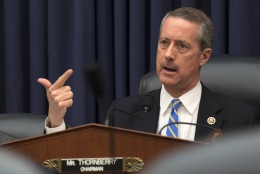House Armed Services Committee
-
House Armed Services Committee Chairman Mac Thornberry singled out new acquisition reform goals and a possible Defense Department reorganization for the 2017 Defense authorization bill.
January 13, 2016 -
The Defense Department will have to fill Congress in on certain conditions surrounding multi-year contracts 30 days before they are awarded if a new proposed rule is adopted.
January 04, 2016 -
The Office of Management and Budget, the Homeland Security Department and the Office of Personnel Management decided not to testify during a classified briefing before the House Armed Services Committee when they found out the meeting would be on the record and transcribed.
November 17, 2015 -
Congress is figuring out which programs will feel the pain of a $5 billion cut to defense spending so the plan can fit the new budget deal. House Armed Services Committee Chairman Mac Thornberry (R-Texas) said the cuts will affect important programs.
November 02, 2015 -
The Defense Department is conducting a study that looks at pairing the agency with industry to manufacture trusted microelectronics.
October 30, 2015 -
The annual National Defense Authorization Act (NDAA) Congress sent to President Barack Obama on Tuesday contains nearly 100 separate provisions intended to reform the Defense Department's acquisition system. But that’s just the start, say Capitol Hill’s top two Defense legislators.
October 20, 2015 -
Defense Secretary Ashton Carter said Wednesday that he has advised President Barack Obama to veto the Defense Authorization bill Congress will vote on later this week for several reasons.
October 01, 2015 -
The Defense Authorization Act will expand milestone decision authority for military service chiefs, it just has to get past President Obama first.
September 30, 2015 -
Sen. John McCain (R-Ariz.), chairman of the Senate Armed Services Committee, said he thinks negotiators from the House Armed Services Committee and his committee will wrap up their discussions within the next week or so. Language on defense procurement in both bills is part of the negotiation going on right now between the two committees. Jon Etherton, principal of Etherton & Associates, explains the similarities and differences in the two bills on In Depth with Francis Rose.
July 01, 2015 -
The Defense Department's inspector general has reversed its findings on the Marine Corps' 2012 schedule of budgetary activity, saying the clean opinion it first issued is no longer to be relied upon. The 2012 SBA had been the first successful financial audit for any of the military departments.
March 24, 2015 -
Rep. Mac Thornberry (R-Texas), the chairman of the House Armed Services Committee, said the acquisition proposals he will release on Wednesday are merely a discussion draft and he's actively seeking more input. Initial language would boost program managers' roles in the system and shave reporting requirements.
March 24, 2015 -
Pentagon officials are adamant that sequestration-level spending is incompatible with the current Defense strategy. But, they also have serious concerns with the plan House Republicans released this week to boost Defense funding, saying it would limit their options and keep the military in a state of budget uncertainty.
March 20, 2015 -
The Defense Business Board outlines three approaches for the Pentagon to save $125 billion across six administrative areas. Defense Deputy Secretary Bob Work said the 90-day study will help his department improve productivity as sequestration looms.
March 18, 2015 -
Defense technology officials told House lawmakers that progress toward a Joint Information Environment would be delayed by two-to-three years if budget caps remain in place.
February 27, 2015 -
Frank Kendall, the undersecretary of Defense for acquisition, technology and logistics, told the House Armed Services Committee that a bunch of incremental changes could help DoD find success with its acquisitions more often. The seven legislative proposals address redundant documents and processes that the military needs help from Congress to get rid of and give program managers more time.
January 29, 2015








